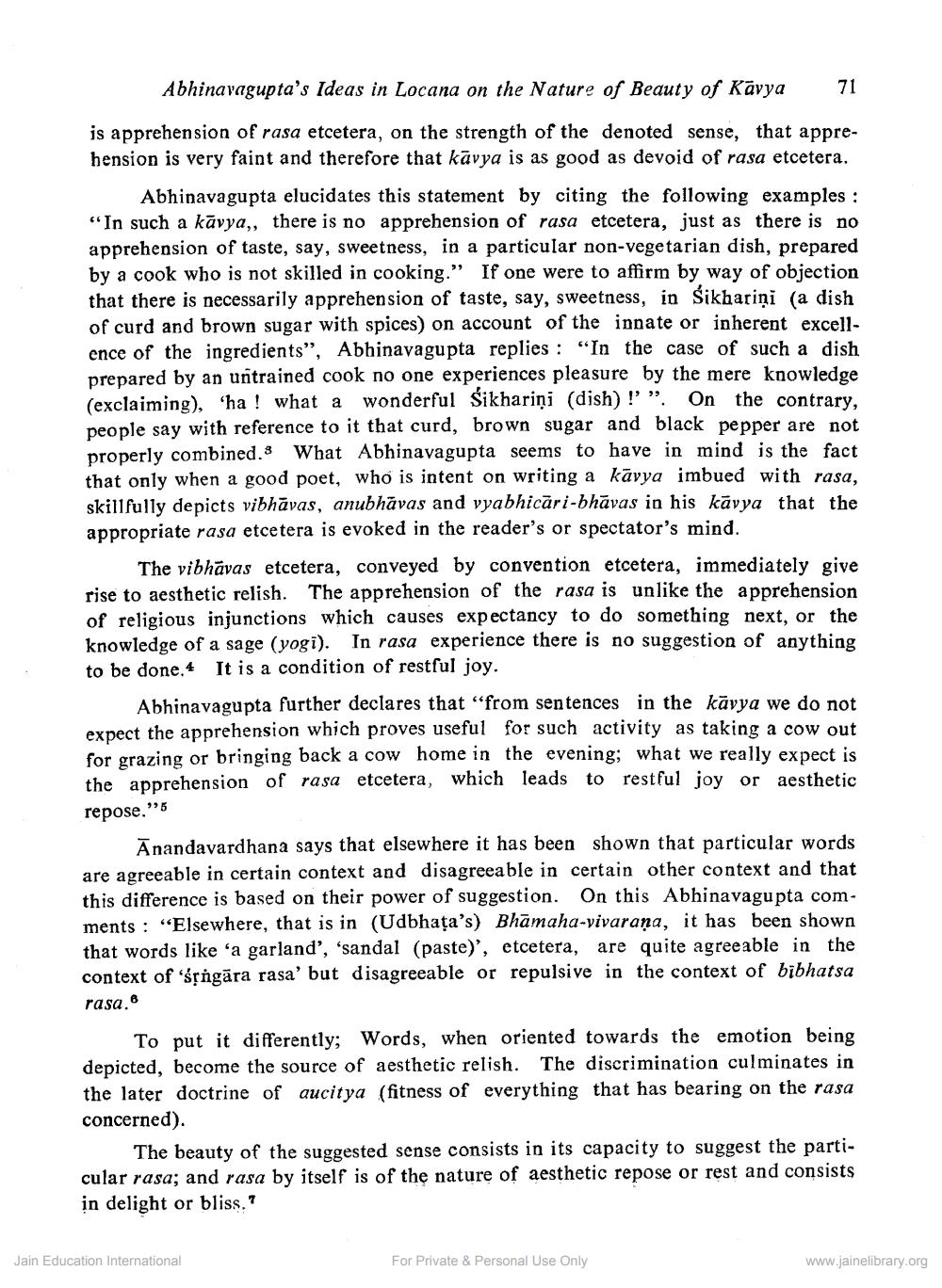Book Title: Abhinav Guptas Ideas in Locana on Nature of Beauty of Kavya Author(s): V M Kulkarni Publisher: Z_Aspect_of_Jainology_Part_2_Pundit_Bechardas_Doshi_012016.pdf View full book textPage 2
________________ Abhinavagupta's Ideas in Locana on the Nature of Beauty of Kavya 71 is apprehension of rasa etcetera, on the strength of the denoted sense, that apprehension is very faint and therefore that kavya is as good as devoid of rasa etcetera. Abhinavagupta elucidates this statement by citing the following examples: "In such a kavya,, there is no apprehension of rasa etcetera, just as there is no apprehension of taste, say, sweetness, in a particular non-vegetarian dish, prepared. by a cook who is not skilled in cooking." If one were to affirm by way of objection that there is necessarily apprehension of taste, say, sweetness, in Sikharini (a dish of curd and brown sugar with spices) on account of the innate or inherent excellence of the ingredients". Abhinavagupta replies: "In the case of such a dish prepared by an untrained cook no one experiences pleasure by the mere knowledge (exclaiming), 'ha! what a wonderful Sikhariņi (dish)!". On the contrary, people say with reference to it that curd, brown sugar and black pepper are not properly combined. What Abhinavagupta seems to have in mind is the fact that only when a good poet, who is intent on writing a kavya imbued with rasa, skillfully depicts vibhāvas, anubhavas and vyabhicari-bhāvas in his kävya that the appropriate rasa etcetera is evoked in the reader's or spectator's mind. The vibhāvas etcetera, conveyed by convention etcetera, immediately give rise to aesthetic relish. The apprehension of the rasa is unlike the apprehension of religious injunctions which causes expectancy to do something next, or the knowledge of a sage (yogi). In rasa experience there is no suggestion of anything to be done. It is a condition of restful joy. Abhinavagupta further declares that "from sentences in the kävya we do not expect the apprehension which proves useful for such activity as taking a cow out for grazing or bringing back a cow home in the evening; what we really expect is the apprehension of rasa etcetera, which leads to restful joy or aesthetic repose."'s Anandavardhana says that elsewhere it has been shown that particular words are agreeable in certain context and disagreeable in certain other context and that this difference is based on their power of suggestion. On this Abhinavagupta comments: "Elsewhere, that is in (Udbhata's) Bhamaha-vivarana, it has been shown. that words like 'a garland', 'sandal (paste)', etcetera, are quite agreeable in the context of 'irágära rasa' but disagreeable or repulsive in the context of bibhatsa rasa. To put it differently; Words, when oriented towards the emotion being. depicted, become the source of aesthetic relish. The discrimination culminates in the later doctrine of aucitya (fitness of everything that has bearing on the rasa concerned). The beauty of the suggested sense consists in its capacity to suggest the particular rasa; and rasa by itself is of the nature of aesthetic repose or rest and consists in delight or bliss." Jain Education International For Private & Personal Use Only www.jainelibrary.orgPage Navigation
1 2 3 4 5 6 7 8 9 10
